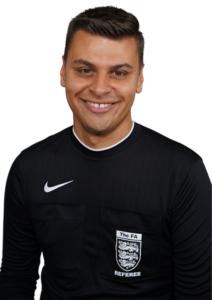No matter how skilled or talented you are as a referee, you’ll never reach your true potential without good advice and mentorship.
No successful official can really go it alone. You have to be open to constructive criticism and then use it to improve.
If you think you have all the answers and don’t need someone else telling you what to do, then you’re completely wrong and you’re deluding yourself. Don’t be single-minded when it comes to this. Don’t limit your development as a referee. Don’t try to reinvent the wheel. Be open to and look for good coaching and advice. It’s always the fastest and smartest way to get to where you want to go in your officiating career.
It is especially in the times when you get frustrated, have a slump, psychological challenge, or get to a place where you’re doing well but know that you have the potential to perform at a higher level, that seeking out and incorporating good feedback can help you overcome something you find difficult or reach a new level of refereeing.
There is a concept in Zen Buddhism called “beginner’s mind,” which refers to having an attitude of openness, enthusiasm, and a lack of preconceptions or judgment. It means approaching a subject with full attention and readiness to learn, even if it’s something you already know quite a bit about. Keep that in mind when an observer offers feedback on an area of your officiating you’ve not yet considered, you see another referee with an unusual style, or when you come across something challenging everything you thought you knew about your officiating. Staying open will also help you understand things better, and that will only increase your chances of climbing the refereeing ladder.
More Ways to Accept And Use Feedback:
Have a Coachable Attitude
This means don’t let your ego get so big that you ignore the wisdom and advice from those who are more experienced and have the benefit of an outsider’s perspective to your officiating technique. Assuming you have a good and fair coach or manager, listen to what they say, work on the areas they pinpoint for improvement, and accept their advice with gratitude for helping you grow rather than dwelling on your perceived inadequacy. Even elite level referees are always open to learning, and that’s what makes them as good as they are.
Ask
It’s simple, ask your coach or manager, a colleague, or someone you admire who in the world of officiating whether they have any recommendations for how you can modify what you are doing. Make sure you understand what they’re really saying and have them clarify or demonstrate if you’re not sure, then work on it, and after some time ask if you’ve made progress in this area and what else you can do better. This requires being humble, something that some referees have a problem with, but asking allows you control of the situation and it might just produce some pleasantly surprising results.
Go Beyond What Is Recommended
If your coach or manager tells you to work on your decision making. Obviously, you should make the time to really practice your movement, understand what Law says, and consider the disciplinary sanctions which may be relevant, but then take it a step further. Find some recent online footage of elite level match officials demonstrating and applying Law on the field of play, look at the disciplinary sanctions that they choose, and see if you can find out or notice a pattern of certain incidents being penalised in a particular way. If you really want to grow as a referee you have to be willing to go beyond just scratching the surface to really dig into developing those skills to the absolute highest degree. Adding multiple perspectives will go a long way in reaching mastery, not just competence.
Commit Yourself To Refereeing
If your heart isn’t in what you’re doing then you’re not likely to care about feedback, and even less likely to actually use it to get better. The more you commit to officiating, and to continually improving and reaching new heights, the more likely you are to really get the most out of your refereeing career, on and off the field of play. So commit yourself, show up early, work hard, train even when you’re not in the gym or at the track, and immerse yourself in learning.
Is it possible that you might get feedback that is not really helpful, which is not coming from someone who really knows what they’re talking about? Yes, of course, everyone has an opinion on officiating, but listen anyway, and always ask yourself if there is some validity to the comments and if there’s something you could still use as a learning opportunity.
Remember that feedback is your friend, not your enemy. Never assume you have perfectly mastered a skill until you are an elite level referee, and even then you’d better keep working as hard as you did to get to that level, in order to stay there!
At The Third Team I work individually and in collaboration with different professionals where I have developed workshops and 1-2-1 sessions associated with Resilience and Mental Toughness Development to help referees. The workshops and 1-2-1 sessions are interactive, where referees are encouraged to open up and share their experiences to help themselves and each other.
Feel free to contact me if you’d like to know more about my workshops or 1-2-1 sessions and how I could help you or your officials.
Best Wishes,

Nathan Sherratt
Referee Educator & Managing Director of The Third Team

Nathan Sherratt
Nathan Sherratt, Referee Educator, Resilience Trainer and Managing Director of The Third Team. A Mental Toughness Practitioner based in County Durham, North East England.

